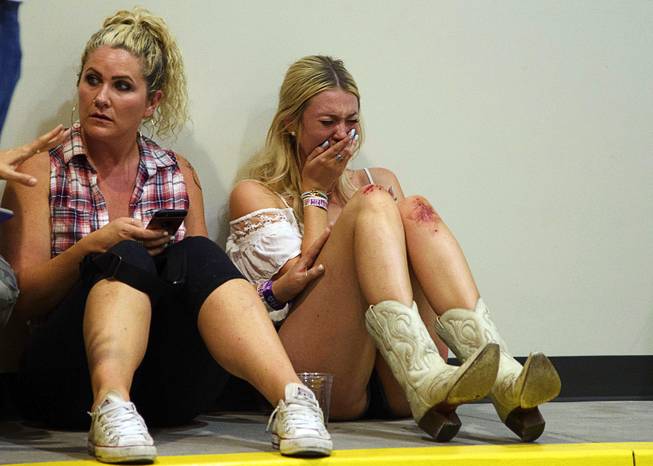
Al Powers / Invision / AP
A woman cries while hiding inside the Sands Corp. plane hangar after a mass shooting in which dozens were killed at the Route 91 Harvest Festival on Sunday, Oct. 1, 2017, in Las Vegas.
Friday, Oct. 6, 2017 | 2 a.m.
Organizations are working together to bring mental health and support services to families after Sunday’s mass shooting, which directly affected tens of thousands and, indirectly, many thousands more.
John Steinbeck, Clark County Fire Department deputy chief and emergency manager, said during a Thursday news conference that it was going to take everyone’s combined efforts to start addressing problems people were experiencing. He said representatives from Orlando and other communities that had experienced similar tragedies described what could be expected over the coming weeks and months, and community organizations have offered services as well.
“Within the beginning moments of this horrible incident, we recognized that we were going to need extensive recovery efforts, and that we were going to need the services of the Family Assistance Center,” he said.
He noted that many of the visitors were from out of state, and needs would change over time. Flexibility would be needed, he said. Families outside of Las Vegas can call 702-455-4281 for information. He said some form of this office would be open for a long time to come, but that the location may change in the future.
“The follow-up is going to be where we really produce the results, so that’ll be ongoing and continuous,” he said.
University of Kansas political science professor Don Haider-Markel, who researches extremism, terrorism and violence, said that with a significant portion of out-of-town residents having been at the venue, this created a struggle in other communities.
“Because those people then get dispersed, the problem gets spread out around the country,” he said. “That’s where, especially with the family members of those who were there, in the venue, really have to be on alert most for signs of PTSD and the trauma that certainly comes after that. Everybody responds to that differently, but just to be aware that any changes in behavior following an event like that, it doesn’t have to be anticipated change in behavior. Like, you might think people would be depressed. It could be the opposite kind of reaction to that. Any change in behavior might be a sign that the person is suffering from PTSD.”
Dan Mosley, the disaster mental health lead for the Red Cross’ disaster response in Las Vegas, is a licensed psychologist with a private practice in Littleton, Colo. He flew out to volunteer, which he’s been doing with the Red Cross since 1993. He cautions that speculating about the killer and his motives isn’t helpful at this point in the recovery process.
“I encourage people to not sort of dig into that now,” he said. “I encourage people to figure out how they can just be supportive to their neighbor, how they can take care of themselves, how they can be thoughtful, good listeners, and reaching out rather than getting consumed with trying to figure out when is the next one going to happen, or why did that person do that. That sort of detracts from our paying attention to our current healing process.”
He said these questions would inevitably come up, and analyses would go on for years.
“But I think in terms of a community’s recovery you could spend too much time doing that,” he said. “Also you could spend too much time watching recycled news clips of the event.”
Mosley said parents should limit their children’s exposure to footage of the event.
“Continual playing of the event and people panicked and running and all that,” he said. “Children don’t need to be exposed to that repeatedly.”
He said the Red Cross volunteers were seeing the community come together, as so often happens in communities experiencing tragedy like this.
“In so many ways we find the community opening their doors offering help, offering services,” Mosley said. “The community’s trying to do the best to support itself.”
He said the Red Cross has been responding to a string of hurricanes, and each area has found a way to come together and be supportive.
“That’s just very very encouraging just on a human level to see that happening,” Mosley said.
The Clark County Coroner’s Office, 1704 Pinto Lane, hours 9 a.m. to 6 p.m. until announced otherwise, is offering a new family information center for those who have lost loved ones. The center will help with tasks such as coordinating families with mortuaries and obtaining a death certificate.
Services have expanded at the Las Vegas Convention Center’s Family Assistance Center, and the county coroner’s office will have representatives there as well to direct families if they need information.
